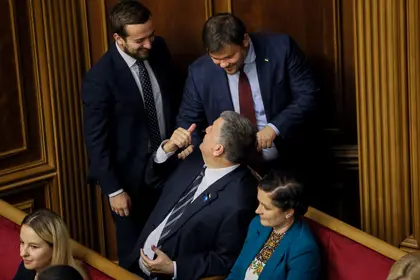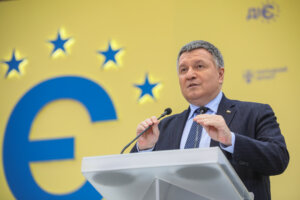The Verkhovna Rada on Aug. 29 approved keeping Arsen Avakov, one of Ukraine’s most controversial top officials, as interior minister.
Avakov’s appointment was included as part of a “package” vote for the whole Cabinet of Ministers. President Volodymyr Zelensky’s critics argue that the package vote was intended to bypass the controversy around Avakov’s appointment.
JOIN US ON TELEGRAM
Follow our coverage of the war on the @Kyivpost_official.
Almost all members of Zelensky’s Servant of the People party and For the Future group voted for Avakov’s appointment, while the pro-Russian Opposition Platform For Life, ex-President Petro Poroshenko’s European Solidarity, ex-Prime Minister Yulia Tymoshenko’s Batkivshchyna and rock star Sviatoslav Vakarchuk’s Voice party did not support the appointment of Avakov and other ministers.
- Get the freshest Ukraine news updates as of today.
- Get the freshest Ukraine news updates as of today.
As many as 24 civil society groups and anti-corruption watchdogs urged Zelensky and the Rada on Aug. 28 not to re-appoint Avakov. These include the Anti-Corruption Action Center, AutoMaidan, StateWatch, Transparency International Ukraine and the Dejure legal think-tank.
“Avakov is associated with the old policy of corruption and hypocrisy,” they said in a joint statement. “Avakov is responsible for failing to reform the police, sabotaging the vetting of police officers, keeping tainted police officials and suspects in EuroMaidan cases in key jobs, failing to investigate attacks on civic activists and numerous corruption scandals linked to him and his inner circle.”
Avakov has denied the accusations.
The appointment of Avakov has also been lambasted as a possible sign of tycoon Ihor Kolomoisky’s influence on Zelensky. Kolomoisky calls himself a friend of Avakov.
Avakov is the longest-serving minister, having held his job since February 2014. His stint in office has been marred with numerous accusations of corruption and sabotage of reforms.
In 2017 Avakov’s son Oleksandr and Avakov’s ex-deputy Serhiy Chebotar were arrested and charged by the National Anti-Corruption Bureau of Ukraine with embezzling Hr 14 million in a case related to the supply of overpriced backpacks to the Interior Ministry. They deny the accusations.
In 2018 anti-corruption prosecutors closed the case against Oleksandr Avakov and Chebotar. However, Security Service of Ukraine video footage has been published on the Internet where Oleksandr Avakov and Chebotar discuss a corrupt scheme to supply backpacks to the National Guard in Chebotar’s office.
In another video published on the Internet, Chebotar, the Interior Ministry’s State Secretary Oleksiy Takhtai and state firm Spetsvervis CEO Vasyl Petrivsky, an ex-aide to Avakov, negotiate a corrupt deal to sell sand at a rigged auction in Chebotar’s office.
In the video, Chebotar implicates the minister himself in the deal, saying that Avakov is also aware of the scheme and is worried that the sand has not been sold yet.
Petrivsky has already pled guilty and has been convicted to a suspended prison term in a theft case for the sand sale scheme described in the video.
In yet another video being investigated by the NABU, Avakov’s deputy Vadym Troyan and Chebotar discuss revenues from the traffic police and extorting money from businesspeople. They deny the accusations of wrongdoing.
Meanwhile, civic groups that took part in police reform efforts said in 2016 that Avakov had taken over vetting commissions and blocked the firing of tainted police officers.
Avakov’s police have also been lambasted for failing to investigate about a hundred attacks on activists and journalists since 2014, including at least 12 murders.
Specifically, Avakov’s police has been criticized for failing to identify a single suspect in the killing of Belarusian-Ukrainian journalist Pavlo Sheremet in a car explosion in central Kyiv on July 20, 2016.
You can also highlight the text and press Ctrl + Enter





